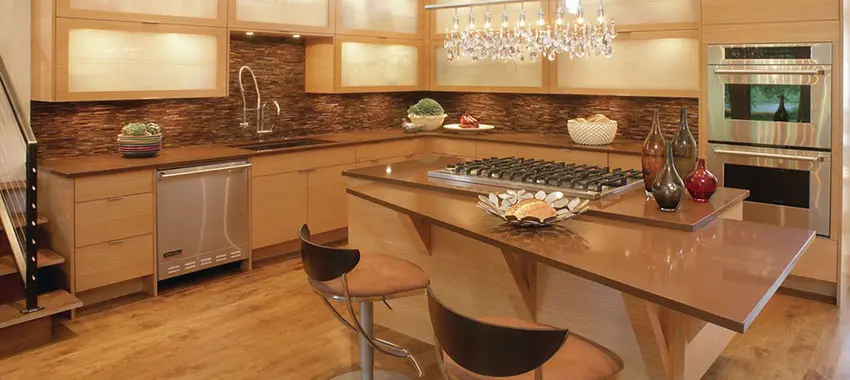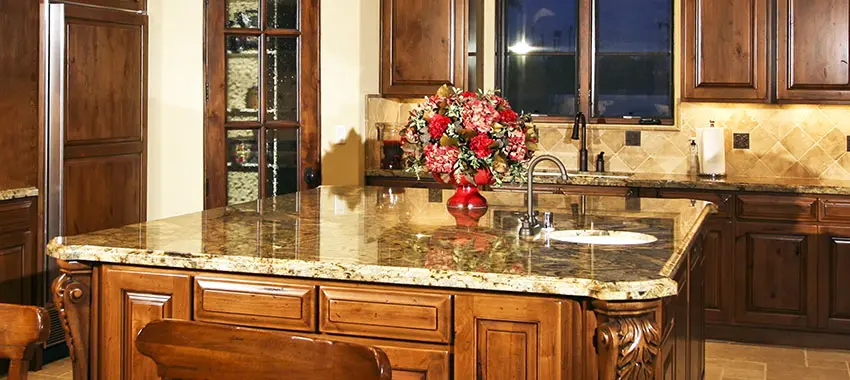Mar
9 Reasons Why You Should Not Buy Laminate Countertops
- 2024
- FlintStoneTops
Laminate is one of the cheapest materials that can be used for kitchen countertops. Here are some reasons why you would want to think twice before choosing laminate countertops and instead of laminate, choose quartz countertops.
Disadvantages Of laminate Countertops
It Looks Cheap
It’s a hard hit, but it’s true. Laminate countertops, even though they have a very versatile and can be made to look like any material you want, can look cheap at times. You can definitely tell if your kitchen countertops are cheap or luxurious just by looking at them and sadly, laminate countertops don’t pass the beauty test.
The feel of the material isn’t the best as compared to natural stones and the look is similar to shiny plastic, which might sound okay, but it’s not.
There is an array of colors and patterns to choose from, but there is not a single one that exudes a contemporary and lux vibe. It’s entirely generic and the ones that look like wood or natural stones still appear a bit fake.
Yes, the material is inexpensive, but that doesn’t mean that the looks need to be compromised. Even concrete countertops look better in appearance when compared side by side to laminate. Looks matter the most to a majority of people and laminate countertops just doesn’t cut it.
It Can Get Stained
You might think that because of the super hard and non-porous surface, laminate can’t get stained. Well, this demerit is going to burst that little bubble. Laminate countertops are susceptible to stains, especially if you don’t clean them every single day. Food, liquid spills, and even dried-up food can be a nightmare to remove if you let these things sit on the surface for too long.
While it’s recommended that you clean your countertops daily, this fact can still be off-putting for a lot since laminate is marketed as a low-maintenance material. Given its characteristics, however, it’s not different from natural stones that need to be maintained by regular sealing, polishing, etc. So, why not choose something that’s at least pretty to look at and will add some value to your space? This is why quartz countertops are much better than laminate. But it comes with a bit higher price tag.
Not Scratch-Resistant
This one is truly discouraging because laminate is a hard material. When you see those ugly and deep scratches on the surface of laminate, your heart will drop to the floor. As unfortunate as it sounds, it’s something that you need to accept. Laminate is not scratch-resistant.
Sharp knives, pointy skewers, and even certain utensils will scratch the hard surface and it will stick out like a sore thumb. You would know how a single scratch can ruin the look of your countertops and laminate falls right into that category. At least, with natural stones and even some man-made options, scratches don’t occur that easily.
You can take quartz, limestone, tiles, and even soapstone and these options will sustain scratches, so they’re better materials than the seemingly cool laminate. So, whatever you do at the end of the day, choose the material wisely.
It Can Get Chipped
Laminate might look like a material that could, at least, resist breaking, but unfortunately, that’s not true either. Laminate is highly susceptible to breakage and even though it’s not primarily because of impact forces, it’s still quite a letdown.
Usually, the main culprit is temperature which can allow the surface or the sides of laminate to crack and chip, and you know what that means. One small chip can lead to a trail of them in no time and it can ruin the countertops.
So, if you’re considering laminate countertops, then keep this detail in mind, otherwise you will be highly disappointed.
Heat Stains
Speaking of temperatures, high heat and laminate also don’t go together when appearance is concerned. If you put hot pots and pans directly on the surface of laminate countertops, then be prepared to greet hideous heat stains. They’re extremely unpleasant to look at and the worst thing about them is that they are essentially irreversible. You can’t get rid of them no matter what unless you want to change the countertops altogether.
This is highly inconvenient as there are better stones, like granite and quartz that seem unfazed by the rising temperatures in the kitchen. Since natural stones are made under the influence of high temperatures and man-made stones like quartz and engineered stones are reinforced with strength and durability, hot things aren’t an issue for them. However, the same can’t be said for laminate countertops.
Full disclosure though, if you have natural stone or quartz countertops, you should still avoid putting hot pans directly on the surface.
Not Long-Lasting
With the continuous list of downsides of laminate, it won’t come as a surprise to you that this material is also not as long-lasting. Yes, it can last a couple of years, but that’s still not enough to justify the already low price of laminate.
If you’re looking for a countertop material that’s fairly decent in durability, then there are other materials that you can choose from and they won’t have other problems that laminate has. Laminate countertops are the epitome of the saying “You get what you pay for”.
Water Can Damage Them
Water can damage most countertops like natural stones and wood especially if you don’t seal them and laminate countertops aren’t safe from the throes either. It won’t cause the material to disintegrate, per se, but it will lead to water stains and an overall murky appearance that’s not pleasant to look at.
If you let water or spills sit on the surface of laminate countertops for too long, then it could lead to penetration inside the material, and over time, fungus and mold can form, and those are things you certainly don’t want in your kitchen.
Need Professionals For Repair
Considering that laminate countertops are very easy to install, this con might surprise you. Laminate countertops, when damaged, aren’t so easy to repair and you are going to want to have professionals on speed dial if you don’t want matters to worsen even more. Professional repair costs shoot through the roof and they can add up over time, especially if your countertops are always damaged. Not to mention, it also takes some time for the countertops to be reinstalled in the kitchen again, depending on the severity of the damage. So, here’s a question: Are laminate countertops worth going through all of this trouble?
Don’t Look Like The Real Stones
Laminate countertops are marketed as countertops that can mimic almost any material on Earth. Well, this is a huge claim and it is also one of the major selling points of laminate as well. But does it mimic natural stones to the T? No! Some things are just too good to be true and this fact about laminate countertops is one of them.
Even though there is a slight resemblance, you can still tell if the countertops are the real thing or a fake. So, save yourself from the embarrassment.
Conclusion
Even though laminate is a good choice for people who don’t have an elaborate budget, there are better options out there that can look as pretty as well as they function. Contact quartz countertop contractors Rockville and you will find some slabs that are durable and also affordable.



